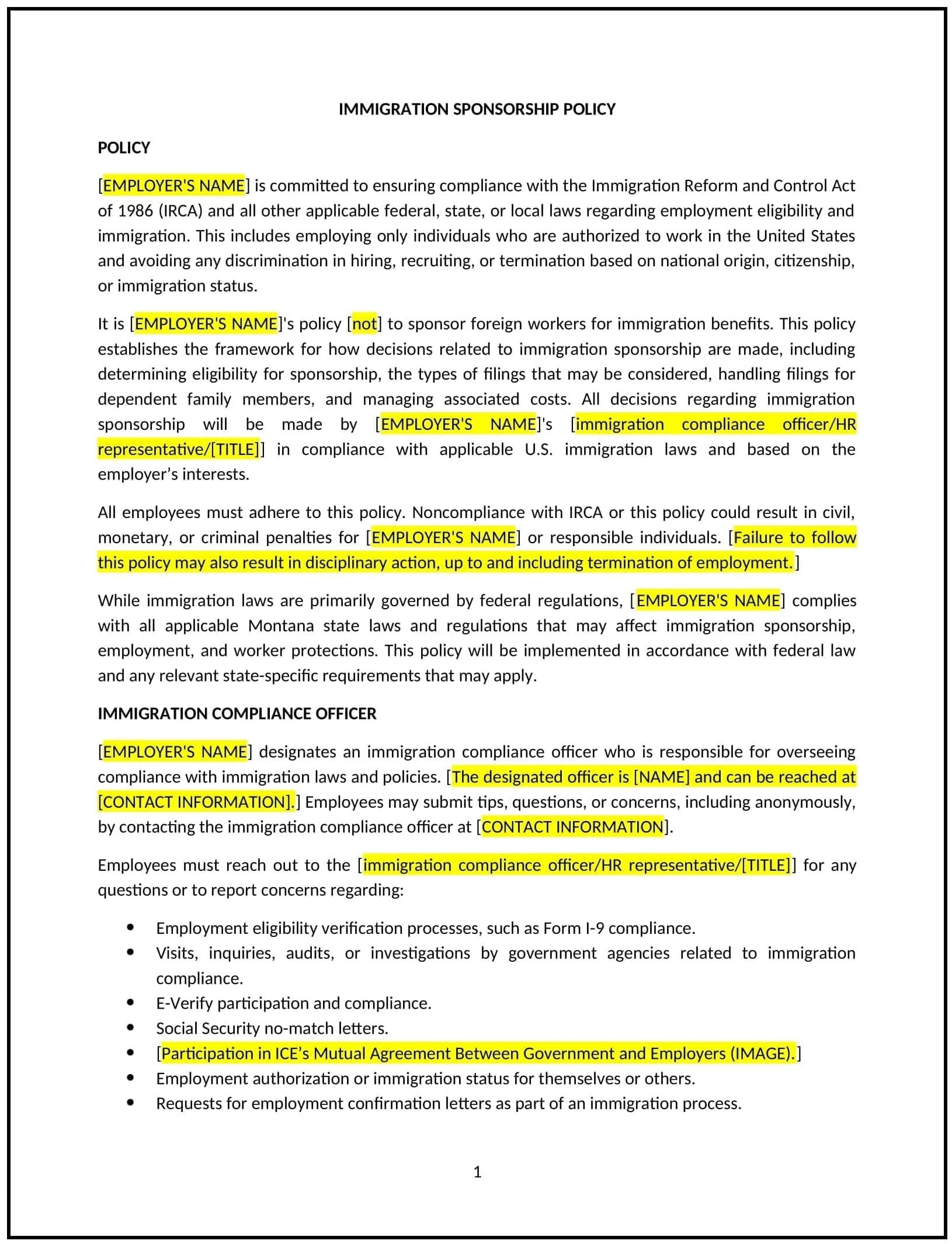Immigration sponsorship policy (Montana): Free template
Got contracts to review? While you're here for policies, let Cobrief make contract review effortless—start your free review now.

Customize this template for free
Immigration sponsorship policy (Montana)
An immigration sponsorship policy helps Montana businesses navigate the process of sponsoring employees for work visas or permanent residency. This policy outlines the criteria for sponsorship, the process employees must follow to obtain sponsorship, and the employer’s responsibilities throughout the sponsorship process.
By implementing this policy, businesses can attract and retain talented workers from around the world, comply with immigration laws, and provide support for employees seeking to work in the United States long term.
How to use this immigration sponsorship policy (Montana)
- Define eligibility for sponsorship: The policy should specify the criteria under which employees may qualify for immigration sponsorship. This could include the employee’s job role, skills, and qualifications needed for sponsorship, as well as the length of employment required to be eligible.
- Clarify the types of visas sponsored: Businesses should specify which types of visas they are willing to sponsor, such as H-1B, L-1, O-1, or employment-based green cards. The policy should outline the requirements and steps involved for each type of visa.
- Explain the sponsorship process: The policy should provide a detailed explanation of the steps involved in the sponsorship process, including the documentation required, timelines for processing, and employee responsibilities throughout the process.
- Outline the employer’s obligations: The policy should make clear the employer’s role in supporting the sponsorship process, including covering legal and filing fees, providing necessary documentation, and complying with immigration regulations.
- Address the costs associated with sponsorship: The policy should specify who is responsible for covering the costs associated with immigration sponsorship, including legal fees, application fees, and government charges.
- Clarify job retention and sponsorship guarantees: The policy should address how long employees need to remain employed with the company after being sponsored, as well as the potential consequences if the employee leaves the company before their visa or green card process is complete.
- Review and update regularly: Businesses should periodically review the immigration sponsorship policy to ensure it aligns with any changes in immigration laws, company hiring practices, or the needs of the business.
Benefits of using this immigration sponsorship policy (Montana)
This policy provides several key benefits for Montana businesses:
- Attracts top global talent: Immigration sponsorship allows businesses to hire highly skilled workers from around the world who may not otherwise be eligible to work in the United States.
- Reduces hiring barriers: By offering sponsorship, businesses can tap into a larger pool of qualified candidates and overcome restrictions related to local talent shortages.
- Retains valuable employees: Sponsoring an employee for permanent residency can increase job satisfaction and loyalty, as employees are more likely to stay with the company long-term if they are supported in obtaining permanent work authorization.
- Supports diversity and inclusion: Immigration sponsorship contributes to a more diverse workforce, bringing in employees with different perspectives, experiences, and skills, which can enhance creativity and innovation within the business.
- Enhances the company’s reputation: Businesses that offer immigration sponsorship demonstrate a commitment to diversity, equity, and opportunity, which can positively impact their reputation among both employees and customers.
- Facilitates compliance with immigration laws: A well-defined policy helps businesses stay compliant with immigration regulations, reducing the risk of fines, penalties, or other legal consequences.
Tips for using this immigration sponsorship policy (Montana)
- Communicate the policy clearly: Ensure that all employees are aware of the immigration sponsorship policy and understand the criteria and process for obtaining sponsorship.
- Provide resources and support: Offer resources, such as access to immigration attorneys or HR personnel, to help employees navigate the sponsorship process and address any questions or concerns they may have.
- Maintain open communication with sponsored employees: Keep open lines of communication with employees undergoing the sponsorship process, ensuring they are informed of any updates, changes, or additional steps they need to take.
- Establish a timeline: Create a clear timeline for the sponsorship process, outlining key milestones, such as when documents need to be submitted, when applications are expected to be filed, and estimated processing times.
- Regularly review the policy: Businesses should review the policy annually or as needed to ensure it reflects any changes in immigration law, internal processes, or hiring needs.
- Evaluate sponsorship costs: Businesses should regularly assess the financial impact of immigration sponsorship and ensure that the costs associated with the process are accounted for in the overall budget.